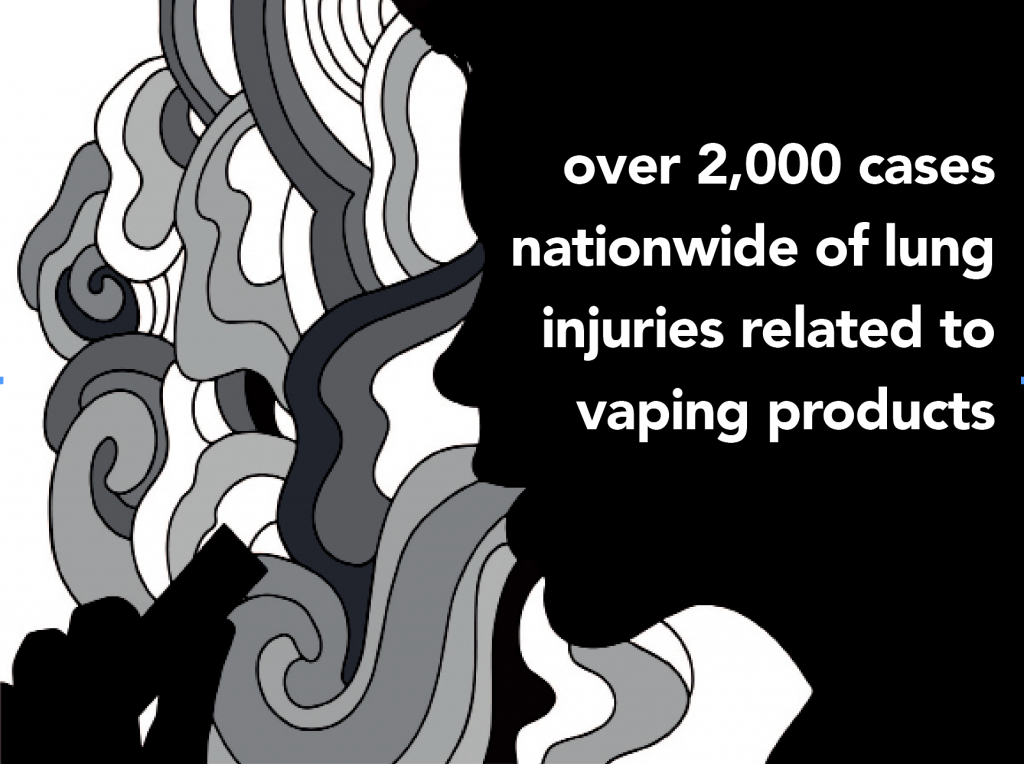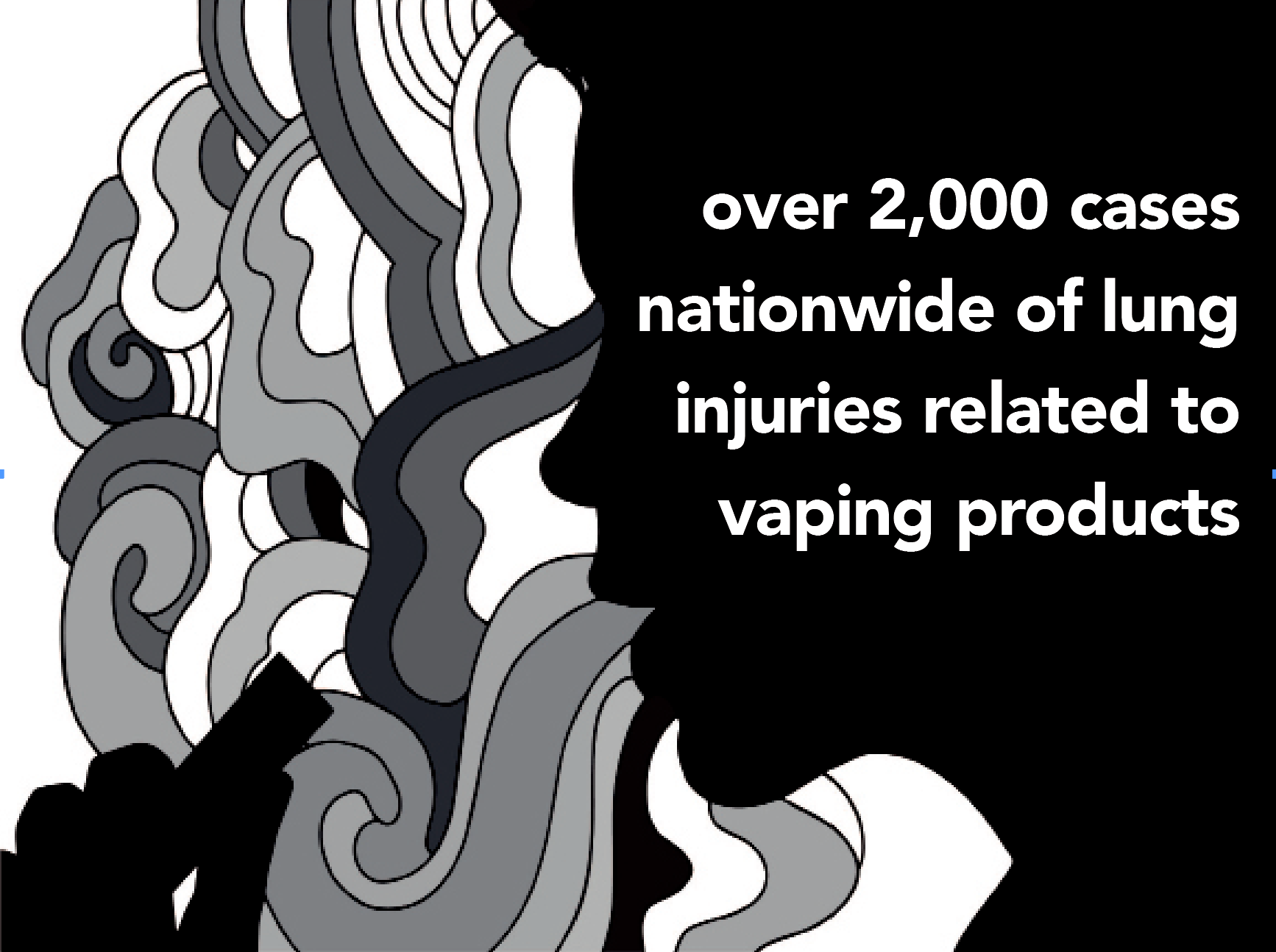
Over 2,000 cases of lung injury and 42 e-cigarette- and vaping-related deaths nationwide have been reported by the Center for Disease Control (CDC). Despite these statistics, the number of Rollins students vaping on campus has increased every year for the past three years, according to data from the Office of Community Standards and Responsibility.
The chemical vitamin E acetate has been identified as one of the major culprits of the recent spike in illnesses and deaths, which mainly occur when vaping products containing tetrahydrocannabinol (THC). Using THC products for recreational purposes is illegal in the state of Florida. However, the CDC has warned that other chemicals may also be responsible for the outbreak.
According to self-reported data from 207 Rollins students taking the Wellness Center’s TARS Checklist Survey, about 19 percent of students said that they had used vape products, cigarettes, or other nicotine-containing products within two weeks prior to participating in the survey, and about 17 percent said they had used marijuana in the same time period.
Megan Asmussen (‘22MA), wellness outreach graduate assistant at Rollins, said multiple students have been hospitalized with lung problems, including several atypical cases of pneumonia requiring heavier treatment than normal. Asmussen did not specify whether these cases were related to vaping, nor how many hospitalizations there have been during this semester.
Student Attitudes Around Vaping
Students have noticed a correlation between THC usage and vape product usage on campus. According to one student who wished to remain anonymous, their peers have started vaping THC as opposed to smoking marijuana because they perceive that vaping affects lung function less than traditional smoking. In addition, the student noted that some of their peers vape with THC because it is less conspicuous than smoking marijuana, due to the lack of obvious odor and quick evaporation of vape smoke.
Some students have turned to vape devices as an alternative to cigarettes. Travis Marron (‘21HH), president of the Rollins chapter of the Students for Sensible Drug Policy, started vaping when he realized his cigarette-smoking habit affected his ability to participate in other hobbies, such as bike riding.
“Unfortunately, I am addicted to nicotine, [but vaping has] helped me to at least clear my lungs a little bit,” said Marron.
Regulation and Enforcement of Vaping Policy on Campus
In March 2019, Governor Ron DeSantis signed a bill that made medical marijuana legal in Florida.
Because of the illegality of recreational THC use on a federal level, however, many vape products containing vitamin E acetate are unregulated by the FDA and banned from college campuses, which receive federal funding.
“We view vaping the same as smoking, and vaping with THC the same as possession of a controlled substance,” said Ken Miller, assistant vice president of Public Safety. “We must follow federal guidelines as it pertains to marijuana, which means that it is illegal and will be processed through our Office of Community Standards, and referred to Winter Park Police Department.”
According to Rollins’ community standards guidelines, students over the age of 18 are permitted to vape on campus at designated locations.
However, students can still receive disciplinary actions if they are caught vaping in a non-designated location. Students are not permitted under any circumstances to vape with THC.
Maeghan Rempala, director of Community Standards & Responsibility, said, “Ramifications would depend on how many times a student has been through the process, but typically the student has an educational conference with a conduct educator, and there are no sanctions—just an educational conversation and a discussion about how to avoid this issue in the future.”
Treatment and Prevention of Vaping Addiction
Although reports of vaping-related lung injuries are subjects of current research, the negative effects of vaping have been well documented. Vaping has been known to cause dry mouth, headaches, inflammation, dizziness, and chest pain, among other side effects.
Vape products also contain a high concentration of nicotine. According to the CDC, a single JUUL pod contains the same amount of nicotine as a pack of cigarettes.
A 2018 study by the National Academy of Medicine found a correlation between the use of e-cigarettes and future use of regular cigarettes.
The Wellness Center has several intervention programs to help students who are struggling with nicotine addiction and substance abuse.
“There are individual sessions and a substance abuse group that meets on campus, but the students will first meet to have a clinical consultation to figure out which resources fit their unique needs best,” said Asmussen.
Dr. Connie Brisco, director of the Wellness Center, said, “As for funding, we are fortunate to have had some donated funds that we have been able to use to do substance abuse prevention work, and we also have the SAMHSA [Substance Abuse and Mental Health Services Administration] grant that provides additional funding for substance abuse prevention work.”
Students trying to quit vaping or any type of substance abuse can find resources at the Wellness Center.
More information on the vaping-related lung disease outbreak can be found at https://www.cdc.gov/.





















The school doesn’t have a right to take action until there is evidence that these will harm people, Until then, nothing will happen to stop the usage. We can strongly encourage people to stop, but there’s nothing forcing or preventing people from using them for now.
The school doesn’t have a right to take action until there is evidence that these will harm people. Until then, nothing will happen to stop the usage. We can strongly encourage people to stop, but there’s nothing forcing or preventing people from using them for now.
The school doesn’t have a right to take action until there is evidence that these will harm people. Until then, nothing will happen to stop the usage. We can strongly encourage people to stop, but there’s nothing forcing or preventing people from using them for now.
Thanks.